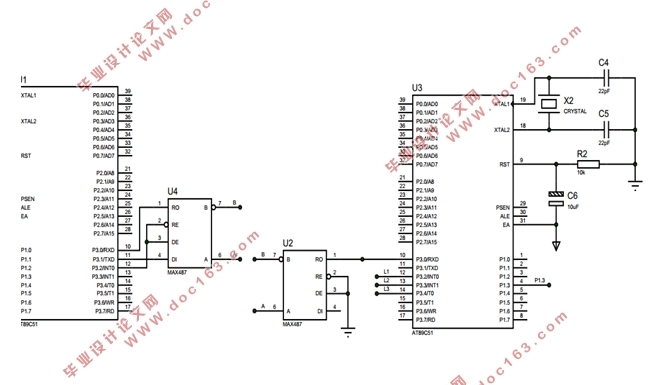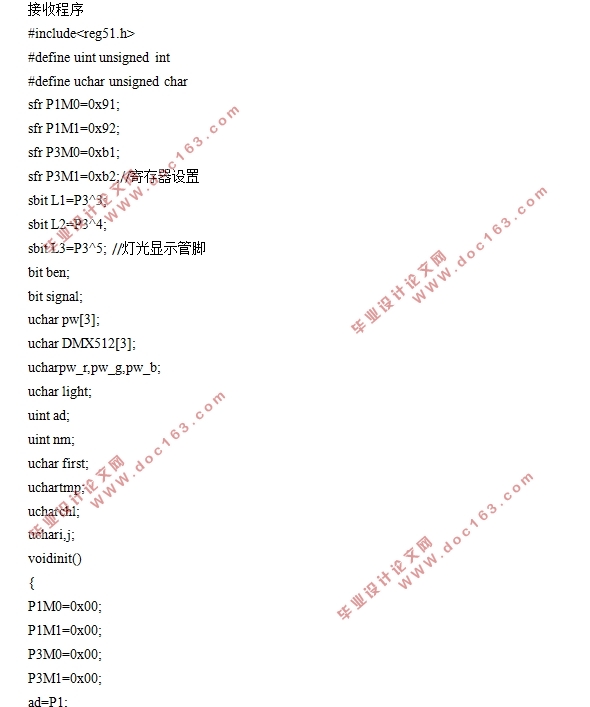基于单片机的数字式灯光调控系统设计

1.无需注册登录,支付后按照提示操作即可获取该资料.
2.资料以网页介绍的为准,下载后不会有水印.资料仅供学习参考之用.
密 惠 保
基于单片机的数字式灯光调控系统设计(任务书,开题报告,外文翻译,论文说明书11000字)
摘要
本文基于DMX512协议,采用单片机及脉冲宽度调制技术,使用UART串口接收DMX512发生模块发送的信号,通过改变PWM的占空比,来控制可控硅的导通角,进而调控灯光的亮度。本论文采用AT89C51单片机作为DMX512发生模块的主要构成部分,通过相应的软件程序和硬件电路,发送DMX512信号,并且完成相应的接收和调光电路。
本论文的主要目的是设计一个基于单片机的灯光调控系统,通过相应的软件以及硬件,对灯光的亮度进行调控。控制系统的调光部分是将DMX512信号产生的PWM控制信号,在经过过零检测后,通过调节可控硅导通角,进而使灯光的亮度发生变化。系统硬件部分主要分为DMX512信号的发生、传输、接收以及灯光控制部分的过零检测、可控硅调光和变压器模块。通过相应软件部分与硬件电路的结合,实现对灯光亮度的调节。
关键词:DMX512协议;单片机;脉冲宽度调制
Abstract
Based on the DMX512 protocol, this paper uses the single-chip microcomputer and pulse width modulation technology to use the UART serial port to receive the signal sent by the DMX512 controller. By changing the duty cycle of the PWM, the conduction angle of the thyristor is controlled, and the brightness of the light is adjusted. In this paper, AT89C51 microcontroller as the main component of the controller, through the corresponding software programs and hardware circuits, send DMX512 signal, and complete the corresponding receive and dimming circuit.
[资料来源:www.THINK58.com]
The main purpose of this paper is to design a light-based control system based on single-chip microcomputer, through the corresponding software and hardware, to control the brightness of light. The dimming part of the control system is the PWM control signal generated by the DMX512 signal. After the zero crossing detection, the thyristor angle is changed, and the brightness of the light is changed. System hardware part is divided into DMX512 signal generation, transmission, reception and lighting control part of the zero-crossing detection, SCR dimming and transformer modules. Through the corresponding software part of the combination with the hardware circuit to achieve the brightness of the light adjustment.
Key words: DMX512 protocol; single chip microcomputer; pulse width modulation



目录
摘要 Ⅰ
Abstract Ⅱ
第1章绪论 1
1.1课题背景 1
1.2目的及意义 2
1.3发展现状及趋势 3
第2章设计方案与分析 4
2.1方案简介 4
2.1.1DMX512协议 4 [资料来源:THINK58.com]
2.1.2脉冲宽度调制技术 6
2.1.3可控硅调压 7
2.2方案分析 9
第3章系统硬件设计 10
3.1系统硬件构成 10
3.2系统的主要硬件电路 10
3.2.1AT89C51单片机 10
3.2.2DMX512信号发生电路 13
3.2.3DMX512信号接收电路 14
3.2.4可控硅调压电路与过零检测 15
第4章系统软件设计 17
4.1系统软件整体结构 17
4.2DMX512信号发送程序 17
4.3DMX512信号接收程序 19
第5章系统调试及运行分析 20
5.1系统仿真 20
5.1.1仿真工具介绍 20
5.1.2仿真过程 20
5.2调试小结 26
第6章结论 27
参考文献 28
致谢 29
附录 30 [资料来源:http://think58.com]
